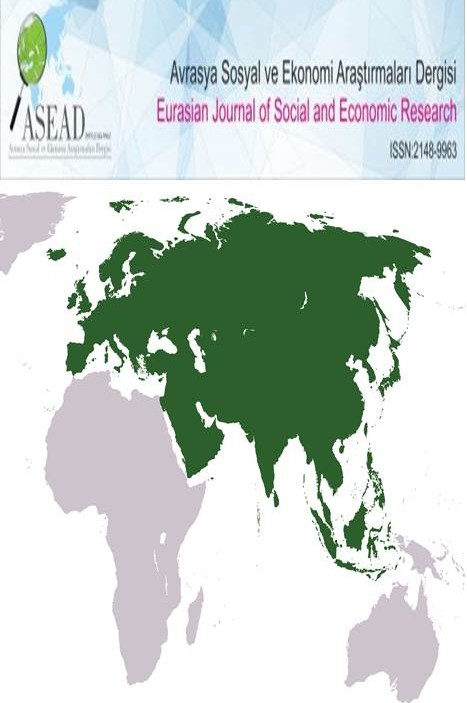THE TECHNOLPGY OF ORGANIZING THE PROCESS OF FORMING THE COMPETENCE OF PLAUSIBLE REASONING OF FUTURE TEACHERS
competence, plausible reasoning, future teacher, open tasks
___
- 1. Solomin V. P. Pedagogical education and science: ways of development [Text] / Solomin Valery Pavlovich // Bulletin of the Herzen University [Text] / RSPU. - St. Petersburg, 2011. - N 11 (97). - pp. 12-21.
- 2. D. Walton; C. W. Tyndale; T. F. Gordon (2014). Application of Modern Methods of Argumentation to Some Ancient Examples of Plausible Reasoning" (PDF). Argumentation. 28 (1): pp. 85-119. doi:10.1007/s10503-013-9306-y.
- 3. Svetlov V.A. Methodological concept of scientific knowledge of Charles Pierce: the unity of abduction, deduction and induction // Logical and philosophical studies. 2008. T. 5. -pp. 165-187. ISSN 2071-9183.
- 4. Fin V. K. Abduction. Internet resource URL: https://web.archive.org/web /20110127013407/http:/iph.ras.ru/page54852159.htm#
- 5. Ruzavin G.I. Abduction as a method of searching and substantiating explanatory hypotheses // Theory and Practice of Argumentation. M., 2001. pp.39-67
- 6. George Fields Mathematics and Plausible Reasoning, Volume I, II: Induction and Analogy in Mathematics. Princeton University Press. 1954. p. 462.
- 7. Khalmos P.R. (1955). Review: G. Pohl, Mathematics and Plausible Reasoning." Bulletin of the American Mathematical Society. 61 (3): 243-245. doi:10.1090/s0002-9904-1955-09904-x
- 8. Collins A. M. (1989). The Logic of Plausible Reasoning: A Basic Theory. Cognitive Science. 13: pp.1-49. doi:10.1207/s15516709cog1301_1.
- 9. Shafrin Yu., Fundamentals of computer technology: Proc. allowance for grades 7-11 on the course "Computer science and computer technology" / Y. Shafrin. - 2nd ed., add. and reworked. - Moscow: ABF, 1997. – p. 655.
- 10. Shmelev D.N. Problems of semantic analysis of vocabulary. - M.: Nauka, 1973. – p. 280.
- 11. Gromyko, N.V. Activity epistemology and the problem of translation of theoretical knowledge in educational practice: author. dis. ... Dr. Phil. Sciences: 09.00.01 / Gromyko N. V. - M., 2011. - 51 p.
- 12. Zhadanov V.I., Charikova I.N. Epistemological aspects of the pedagogical implementation of innovative design technologies in the educational process at the university // Bulletin of the OSU. -2017. No. 10 (210). - pp. 55-58.
- 13. Mikeshina L. A. Philosophy of science: modern epistemology. Scientific knowledge in the dynamics of culture. Methodology of scientific research: textbook. Allowance. M., 2005. p. 464.
- 14. Rockmore T. On Constructivist Epistemology. Lanham, 2008. p. 164.
- 15. The Oxford handbook of epistemology / ed. P. K. Moser. Oxford, 2002. p. 320.
- 16. Bunyatova F. Constructive learning: essence, principle, goals and samples of lessons. - Baku, 2008. – p. 218.
- 17. Krainev I. V. Constructive pedagogy. M., 2004. pp. 5–28.
- 18. Shatalova N. P. ABC of constructive learning. Monograph. - Krasnoyarsk: Scientific and Innovation Center LLC, 2011. –p. 204.
- 19. Glasersfeld E. Radikal constructivism: A. Way of Knowing and learning. London, 1985. Radical constructivism: A. A way of knowing and learning. London, 1985. p. 230.
- Yayın Aralığı: Yılda 4 Sayı
- Başlangıç: 2014
- Yayıncı: İrfan TÜRKOĞLU
DESIGN AND RESEARCH ACTIVITY OF STUDENTS AS A PEDAGOGICAL PROBLEM
İLKOKUL ÖĞRENCİLERİNE SCRATCH PROGRAMLAMA ÖĞRETİMİNDE İSPRİNG'İ KULLANMA OLANAKLARI
Laura MİNNAKHMİTOVA, Almira IBASHOVA, Damira BELESOVA
ARNAVUT ÂLİM HAFIZ ALİ KORÇA’NIN TEFSİR ÇALIŞMALARI
METHODS OF TEACHING THE CHAPTER "ELECTROMAGNETISM " IN PHYSICS USING DIGITAL EDUCATIONAL RESOURCES
Zhanara MALİKOVA, Ganiya ORMANOVA
ABOUT PERIODIC STATES OF SYSTEMS OF MASSSERVICE WITH PERIODIC PARAMETERS
PROBLEMS OF NOUN AND VERB ROOT WORDS IN THE KAZAKH LANGUAGE
Zhuzimkul BAİYMBETOVA, Kenzhegul KAZİBAYEVA
Hüseyin AKKUŞ, Ayash USSENBAY, Aziza KENZHE
THE POSSIBILITIES OF USING GAMIFICATION ELEMENTS IN TEACHING MATHEMATICS
THE IMPORTANCE OF ORGANIZING INDEPENDENT WORK IN CHEMISTRY LESSON
Asylzhan KENESBAY, Galiya MADYBEKOVA, Aliya KARMANOVA, Perizat ABDİGAPBAR
SPECIFIC FEATURES OF THE PROBLEM APPROACH TO TEACHING PRIMARY SCHOOL STUDENTS
